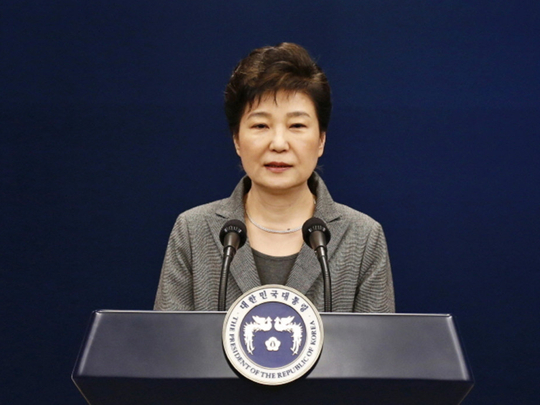
Even as South Korean courts attempt to set a date for public hearings in the case to review parliament’s impeachment of President Park Geun-hye, world media debated the fallout of the influence-peddling scandal.
“It is understandable that South Koreans would celebrate after their Parliament voted overwhelmingly on Friday to impeach President Park Geun-hye, whose involvement with a shady and corrupt confidante has generated six weeks of huge street protests and demands for her resignation,” said the New York Times. “The crisis, and Ms Park’s precipitous fall in public support, had made it all but impossible for her to function effectively. Yet this kind of end for any presidency is not really cause for celebration. However the crisis plays out — and it still has a way to go — Ms. Park’s plight is a symptom of faults in the political system that need to be fixed,” the paper said in an editorial.
Observing that the crisis has kindled considerable uncertainty in a country and a region that can ill afford it, the paper said: “Now that Koreans have vented their anger and grief, they will need to take the difficult step of purging their politics of the lingering notion that corruption is an unavoidable price to pay for economic growth.”
The Hankyoreh in South Korea welcomed the impeachment and said: “The motion for Park’s impeachment is both the first step toward repairing the damaged constitutional order and the beginning of a long journey toward restoring democracy. It is a critical step toward reversing various kinds of harm inflicted on the constitutional order not only by shadowy figures like Choi Sun-sil but also by Park herself, as well as toward healing the people’s wounded pride. Impeaching the president is not a suspension of constitutional government but rather a continuation of constitutional government that complies with constitutional procedure. It is a living testament to the fact that democracy is alive and well in this land.”
In Japan, the Asahi Shimbun reflected on the scandal and said: “Park brought the current political turmoil upon herself. But both the ruling and opposition parties also bear responsibility as they failed to unsnarl the confusion. They, along with Park, must make every effort to restore the country’s politics to normal as soon as possible. Park has so far avoided offering a detailed explanation about her role in the scandal that has led to her downfall... Park has said little about allegations she colluded with a long-time close friend to strong-arm companies belonging to business conglomerates into providing money for funds linked to the friend while allowing that confidante to influence policy decisions. The country’s lawmakers need to use the challenging process of dealing with the current political confusion to push through serious political reform. Otherwise, the public anger will not die down.”
In the Philippines, the Manila Standard called the episode “the end of a painful and drawn-out political scandal” and said: “As they move forward, Koreans should be thinking about how to avoid another one. It seems unlikely that the Constitutional Court, which must ratify Park’s impeachment, would defy such a clear expression of public will. It should now act quickly to eliminate any uncertainty so the next government can take shape without delay. Ideally, an election for a new president can be held within a few months.”
Analysing the road ahead for the country, the paper said: “South Korea’s next leader will want to follow through on Park’s actions to strengthen national security: her decision to station a US missile defence shield in South Korea, for instance, and the deal to increase intelligence-sharing with Japan. And it will be essential to keep sight of the country’s long-term economic needs. As the Choi scandal demonstrated, the chaebol remain as powerful and politically connected as ever. Calls to professionalise their management and ease their stranglehold on the Korean economy have grown louder than ever and should be heeded.”





_resources1_16a31069e4e_small.jpg)






